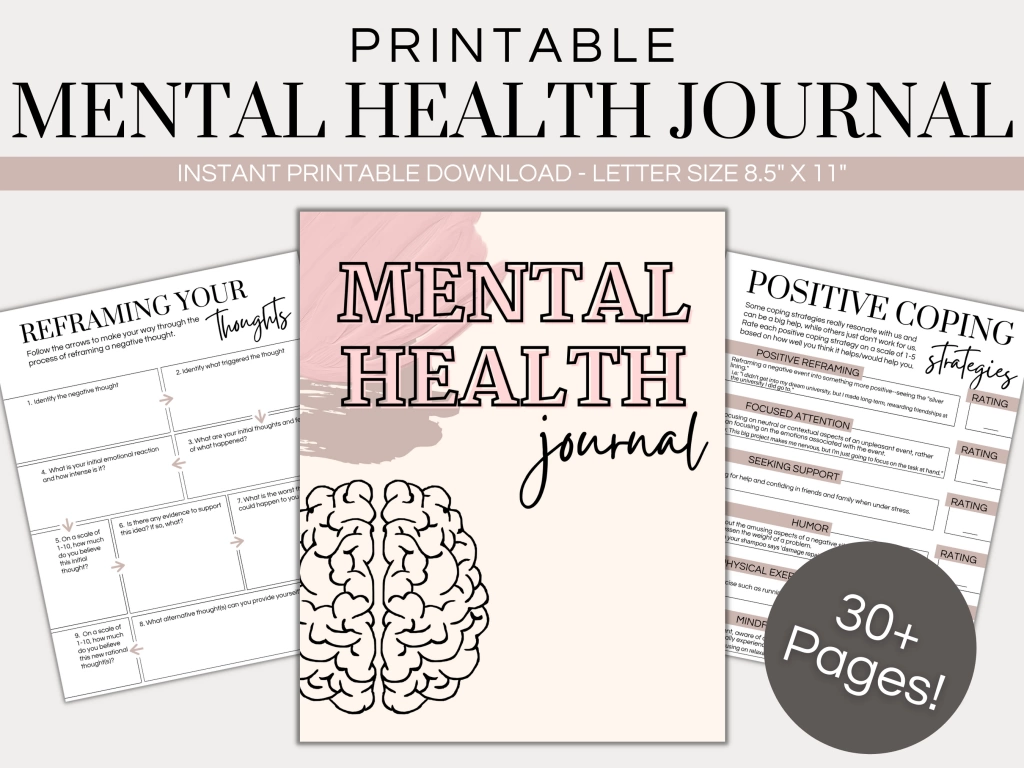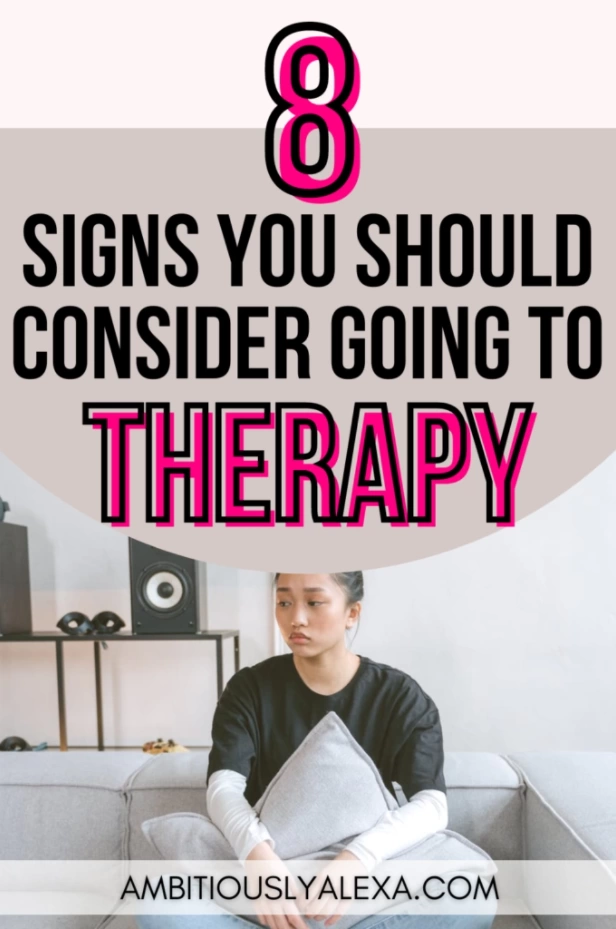8 Reasons Why Everyone Should Go To Therapy (You’ll Be Surprised!)
This post contains affiliate links and I may receive a small commission (at no extra cost to you) if you sign up or purchase products or services mentioned. Read the full disclosure here.
Last Updated on May 16, 2023
Contrary to what you might think, you don’t need a “big reason” to go to therapy. Surprising, right?!
The short answer is that we could all benefit from therapy, whether you suspect mental illness or not. And understanding that you would benefit from going to therapy is a great first step in self-awareness. It doesn’t mean you’re failing, it means that you recognize where you could use some extra support.
We can’t do it all on our own. And for many people, the decision to go to therapy is a very necessary part of their self care and journey to personal growth.
With life’s ebbs and flows, it makes perfect sense that the need for therapy may be stronger at certain points in your life than others. We all experience those little daily stressors life throws at us, so why not talk them out with someone who knows their stuff? You never know, you might come back with a coping skill you never even knew about!
But if you’re on the fence asking yourself “should I go to therapy?,” these reasons will show you why everyone should go to therapy.
Signs you would benefit from going to therapy
- Feeling excessively negative or pessimistic
- Feeling overwhelmed or like there is too much on your plate
- Your problems are remaining unresolved
- Feeling demotivated or apathetic, as if you hardly ever experience bursts of joy
- Fear of the future or planning out your future life plans
- That feeling that something is “missing” in your life but you can’t figure out what it is
If any of those signs ring true for you, it’s worth considering.
But overall, everyone can benefit from going to therapy. Everyone faces stress, difficulties, and challenges. Talking to someone about it and getting professional insight will almost always be beneficial.
This post is all about why everyone should go to therapy.
1. Mental health needs to be checked in on regularly
Possibly even more regularly than your physical health! But just like you probably wouldn’t neglect your physical health, you shouldn’t be neglecting your mental health either.
Think about it. Physical health problems arise here and there, and even when they aren’t present to you, there could be something underlying that you just can’t recognize yourself. That’s why you’re encouraged to go in for routine check ups.
But stress, feeling down, feeling conflicted, etc… these problems can present themselves even more frequently than physical health problems might.
But how can you tell when stress becomes a problem? What is the threshold between a healthy amount of stress and a problematic amount of stress? Without the help of a mental health professional, you might not know. 🤷
All these reasons and more are why everyone should go to therapy. Checking in on your mental health regularly by seeking therapy is SO important.
Did you know that I offer a printable mental health journal that will help you navigate stress and reframe negative thoughts and emotions?
As someone who’s always looking for ways to improve my mental health, I knew just how important it was to create a resource that will actually help you understand your inner-dialogue and coping habits.
This journal can be your first plan of action while thinking over your therapy decision. Check out the printable mental health journal for yourself!

2. Going to therapy helps manage life’s daily stressors
Even if you DON’T suspect you have a mental illness.
Research shows that about 75% of people who go through psychotherapy show some benefit from it.
How? Because therapy works to improve negative emotions and behaviors. It is also linked with positive changes in the brain and body.
And guess what? We all experience negative emotions and behaviors! Even if these emotions and behaviors are fairly mild for you, it always helps to get a little assistance with tackling life’s daily stressors.
You know what’s way less daunting than traditional therapy? Online therapy! Whether you’re struggling with your mental health or just want to get better at tackling life’s daily stressors, talking to an online therapist can really help you out. I always recommend Online Therapy because it’s a comprehensive, effective online therapy toolkit based on CBT (cognitive behavioral therapy–the leading standard in psychotherapy) at an affordable monthly cost. If you’re a little nervous seeing a therapist, this is a GREAT avenue for you.
3. You may have problems that were left unresolved
Trauma, negative childhood upbringings, and bad past experiences of any sort can leave more of a lasting impact on you than you think. Even if you don’t think about a past negative experience much, it still could still be simmering in the background or be triggered in ways you don’t realize.
You could have developed poor coping habits without even knowing it. It never feels good to leave conflict (internal or external) unresolved. So visiting tough topics of the past with a therapist, while uncomfortable at first, can provide relief. Even if you’ve already “worked through it” on your own, a therapist can give you extra guidance to sort out any leftover feelings from your past.
For myself, it wasn’t until seeing my latest therapist that I even discovered that I have trauma and PTSD. I knew I had a few negative experiences as a child and teenager, but I didn’t know they were impacting me to the point where they would be considered traumatic. And knowing’s half the battle!
Trauma impacts your response to things not even related to the original traumatic experience. You’d really be surprised at how negative experiences can manifest in your mindset and fight-or-flight response even years later if left untreated. Since there’s no way to know for sure if you have any trauma that’s impacting you, this is why everyone should go to therapy.
Now that I’ve delved into this, I can work toward healing and living the best life I can, which is the most amazing thing about therapy!
4. New issues in life seem to always be popping up
Entering a new chapter of your life, for example, can mean a different set of problems. Adjusting to adulthood, going to a new school, and getting a new job can all bring on different mental health struggles. Therapy is pretty much always relevant, which is why everyone should go to therapy!
Even if you perceive that things are better now than at some point in the past, sometimes there’s cracks in your mental wellbeing that don’t come up until you open up in therapy.
I’ll give you a great example. My overall quality of life had drastically improved between college and now, two years post-grad.
First of all, I graduated college (one less thing on my plate! Woo!), left a toxic job, got started on my own business endeavor, and I moved out of my parents’ house.
While I still had my struggles, my mental health felt better than ever. But yet, I kept thinking about therapy. I kept wondering if maybe I should go, just for the sake of that upkeep and maintenance on my mental health.
Well, turns out, I really needed it!
Because while my current life seemed great on the surface, I learned that there was a lot of unresolved trauma from my past that still affects me without always realizing it.
That, and I have general concerns for the future that always feel like a relief to talk about with a therapist.
So moral of the story if I haven’t already drilled it into your head: you might really really really need therapy and not even know it til ya get there!
5. You don’t enjoy the things you used to
While life won’t always be jam-packed with excitement 100% of the time, if you can’t remember the last time you truly felt enjoyment out of the things you love, this is a good reason why everyone should go to therapy.
If life just feels like one big exhausting chore, this is a problem. You might be feeling burnt out or you might even be experiencing a sign of depression. We all deserve enjoyment, happiness, and to indulge in things that light us up. Speaking with a therapist can help you uncover the reason why things just don’t feel fun anymore and work with you to improve that.
6. Discovering a possible diagnosis
Some people shy away from the idea of getting a diagnosis they don’t want. And I completely understand that fear. But just like with your physical health, leaving something undiagnosed can be bad news. If a problem exists, it’s better that you’re aware of it. This way, you can get one step closer to treating and managing it.
Or, if you suspect that you may have one mental health disorder, you might find out otherwise after being evaluated by a professional.
Bipolar disorder, for example, is notoriously known for being frequently misdiagnosed as depression. Bipolar disorder patients are very likely to be incorrectly diagnosed with depression actually, at a rate as high as 70.6%.
Bipolar disorder causes extreme mood swings that include emotional highs (mania) and emotional lows (depression). It’s possible that the mania aspect is often overlooked, resulting in a diagnosis of depression only.
And this isn’t mean to scare you! It just serves as a reminder of the importance of checking in with a therapist. Take note that because mental health relies heavily on self-report, it’s important to mention all symptoms and feelings you notice to your therapist to ensure proper diagnosis.
Did you know that affordable online therapy exists?
And it’s perfect for first-time therapy-goers that are a little nervous or hesitant about the whole experience. Online Therapy is an affordable, effective solution for the comprehensive online therapy toolbox you need.
What is included in your online therapy toolbox:
- A qualified therapist that you can message at any time and have regular, weekly live sessions with
- Access to hands-on tools and information for identifying and overcoming problems
- Worksheets to further grow and practice the skills you learn
- An online journal
- An activity plan–(and even yoga!)
What I love about Online Therapy is that their whole operation is based on CBT (cognitive behavioral therapy). This is a very effective and highly regarded therapy approach.
AND it’s pretty hard to resist access to therapy without leaving the comfort of your home! (No anxiety in the waiting room, am I right?)
This makes therapy SO much more manageable for busy schedules.
Get 20% off your first month by using my link!
7. Finding the right treatment and support
With the proper diagnosis comes the proper treatment. Treatment can look like your talk therapy sessions themselves, or being referred to a psychiatrist for medication to treat a chemical imbalance.
And it’s entirely up to you (and your therapist) the direction you want to take your treatment. If being on a medication for anxiety or depression, for instance, isn’t something you want, that is okay! But your therapist will share your options with you and guide you down the most helpful path.
The right treatment can take your life from stressful, lackluster, and challenging to completely manageable and even enjoyable! You might discover options you weren’t aware of and these options can be genuinely life changing.
For myself, even just having someone to vent it ALL out to every week makes a massive difference in my life. I come prepared with a journal full of different sh*t that went down in the week.
We talk it out, my therapist gives me useful advice on how to manage it all, and we work on different practices such as “tapping” my shoulders with my eyes closed to re-process trauma. Your therapy experience and practices will be unique to your situation and your therapist will work with you to find an effective treatment strategy.
But trust me, finally getting treatment really does make all the difference in your quality of life.
8. Finding a therapist that jives with how you want to be treated is invaluable
Feeling like you “click” with a therapist is a feeling that goes unmatched. This reason alone is why everyone should go to therapy, because it’s such a validating thing to have! Feeling heard, respected, and understood is so empowering and helps you feel comfortable opening up. And opening up is essential to making progress in therapy, so make sure you find a therapist that makes you feel this way!
Your therapist might not agree with everything you say, especially if they’re working to help you overcome negative core beliefs and thought processes. But they WILL support you with your best interest in mind, without passing judgment to you.
Never accept anything less than professional, respectful treatment! Remember that if you simply don’t jive with a therapist, or if you feel disrespected in any way, keep looking until you find the one.
This post was all about why everyone should go to therapy.
If you’re unsure of going to therapy, I hope this post provided you with some good things to consider!
Remember that going to therapy is not an “admittance” of “doing bad.” Therapy is just necessary maintenance for your mental health, which can be useful at any stage. It’s why everyone should go to therapy.
If your mental health is something you care about, want to preserve, or want to improve upon, therapy is absolutely a tool you should utilize on your self care journey. So please take advantage of it!
Take care.
IF YOU LIKED THIS POST, YOU’LL LOVE THESE TOO!
I Made A Printable Mental Health Journal…And It Will Change Your Coping Habits
Happy Brain Chemicals: What They Are and How to Hack Them
Why Wallowing In Your Sadness Is Actually Completely Necessary
Ultimate Self Weekend Ideas For Unwinding
10 Powerful Ways to Overcome Self Doubt
LIKE THESE REASONS WHY EVERYONE SHOULD GO TO THERAPY? PIN THEM FOR LATER!









